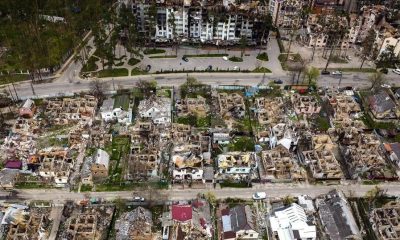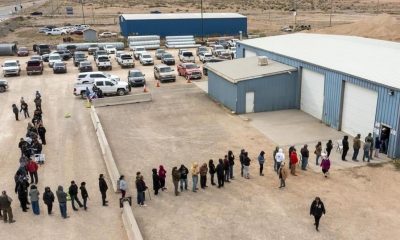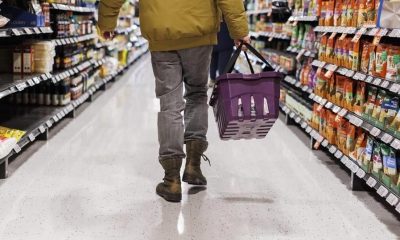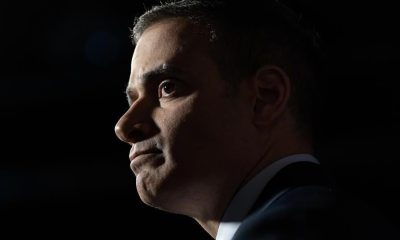Economy
5 ways inflation is shaping the economy
For anyone who grew up in the Clinton, Bush or Obama eras, inflation was a chapter in an economics textbook, a quaint piece of history from the Carter years.
And then, in the second half of 2021, the consumer price index (CPI) took off. The 12-month inflation rate peaked in June 2022 at 9.1 percent, the highest figure recorded since 1981.
Here are five ways inflation has shaped the nation’s economy — and will affect the year to come.
Soaring interest rates
First and foremost, the specter of double-digit inflation triggered a historic rise in interest rates, the dominant economic narrative of 2022. Federal regulators raised rates to slow inflation. Now, both forces are buffeting American consumers.
At the start of the year, the benchmark federal funds rate was 0.25 percent: effectively zero. The Federal Reserve has raised the rate six times this year. It now stands at 4 percent. And the Fed is set to announce its next action on Wednesday.
A reeling housing market
Higher benchmark rates mean higher mortgage rates. The average rate on a 30-year fixed mortgage passed 7 percent in October, up from around 3 percent at the close of 2021, the largest single-year increase in at least half a century.
The Fed acted aggressively to cool an overheated housing market. Home prices rose more than 40 percent from the start of 2020 through mid-2022.
Soaring mortgage rates will hobble home sales.
The National Association of Realtors predicts a 15 percent drop in 2022 and a 7 percent decline in 2023. Homes that do sell will go for less. Redfin predicts prices will fall by 4 percent in 2023 to a median value of $368,000.
Higher mortgage rates squeeze the buyer’s budget. The difference between a 3 percent rate and a 7 percent rate is $1,000 in a monthly mortgage payment on the average American home.
Downsized travel plans
A CNN headline announced the closing weeks of 2022 as the most expensive holiday travel season ever.
Airfares rose more than 40 percent between September 2021 and September 2022, when many holiday travelers contemplated itineraries, according to the Bureau of Labor Statistics. Gas prices are up nearly 20 percent from a year ago. Rental car rates are up by nearly half from pre-pandemic 2019.
More than 80 percent of millennial and Generation Z travelers say inflation tempered their holiday plans, according to a survey by Bankrate, the consumer finance company.
To compensate for higher costs, many travelers will take fewer, shorter holiday trips, book flights earlier and shop around for cheaper itineraries, the survey found.
On the upside, gas prices have eased off from the $5.02-a-gallon record set in June. Hotel rates have risen only modestly since pre-pandemic times.
Fewer gourmet grocery outings
With food prices soaring, that store-brand olive oil and chain restaurant menu are beckoning to the American consumer.
Food prices rose 11 percent from October 2021 to October 2022, according to CPI data. Restaurant food tabs are up a little less, groceries a little more. Eating out still costs a lot more than eating in.
Shoppers are finding creative ways to work around inflation: hunting for sale items, clipping coupons, checking prices online, switching to generic store labels, pivoting from beef to chicken and shopping at discount supermarkets and dollar stores, according to surveys by market researchers Dunnhumby and Bizrate Insights.

Restaurant traffic has largely rebounded to pre-pandemic levels, according to the industry journal Restaurant Dive. Restaurateurs struggled with staffing through COVID-19, but that crisis, too, has eased.
To counter inflation, diners are trading down from swanky farm-to-table restaurants to Applebee’s. Value-oriented chains Texas Roadhouse, Waffle House and Chipotle are doing brisk business.
But Americans seem to be spending more than ever on food delivery, despite the extra costs. One survey found that the average consumer makes more than 50 food delivery orders annually, according to industry journal The Food Institute.
More holiday borrowing
With inflation outpacing earnings, consumers are plundering their savings and amassing debt on credit cards with spiraling rates.
Americans embarked on a saving spree during the COVID-19 pandemic. That’s over. The national savings rate fell to 2.3 percent in October, down from 7.3 percent in October 2021 and 14 percent in October 2020. The savings rate has dipped this low only once before since 1960.
The nation amassed a mountain of savings during the pandemic. Its collective value peaked at more than $2 trillion in 2021. Inflation’s bite has reduced the savings stash to somewhere over $1.5 trillion.
“That trillion and a half dollars will run out sometime midyear next year,” devoured by inflation, Jamie Dimon, CEO of JPMorgan Chase, told CNBC this month.
In a recent survey by insurer New York Life, 36 percent of respondents said they had drawn down their savings in the first half of the year. Many more consumers will tap savings to finance holiday gifts and eggnog parties.
Americans are piling on credit card debt. The nation’s total card balance reached $925 billion in the third quarter of 2022, a 15 percent increase from the same period in 2021. It’s the largest annual jump in more than 20 years, according to the Federal Reserve Bank of New York.
That is worrisome news, because card rates are rising. Credit card interest rates hit 16.27 percent this August, up from 14.54 percent a year ago, according to Federal Reserve data. For people taking on a new card, the rate exceeds 20 percent.
Economy
Canada’s unemployment rate holds steady at 6.5% in October, economy adds 15,000 jobs

OTTAWA – Canada’s unemployment rate held steady at 6.5 per cent last month as hiring remained weak across the economy.
Statistics Canada’s labour force survey on Friday said employment rose by a modest 15,000 jobs in October.
Business, building and support services saw the largest gain in employment.
Meanwhile, finance, insurance, real estate, rental and leasing experienced the largest decline.
Many economists see weakness in the job market continuing in the short term, before the Bank of Canada’s interest rate cuts spark a rebound in economic growth next year.
Despite ongoing softness in the labour market, however, strong wage growth has raged on in Canada. Average hourly wages in October grew 4.9 per cent from a year ago, reaching $35.76.
Friday’s report also shed some light on the financial health of households.
According to the agency, 28.8 per cent of Canadians aged 15 or older were living in a household that had difficulty meeting financial needs – like food and housing – in the previous four weeks.
That was down from 33.1 per cent in October 2023 and 35.5 per cent in October 2022, but still above the 20.4 per cent figure recorded in October 2020.
People living in a rented home were more likely to report difficulty meeting financial needs, with nearly four in 10 reporting that was the case.
That compares with just under a quarter of those living in an owned home by a household member.
Immigrants were also more likely to report facing financial strain last month, with about four out of 10 immigrants who landed in the last year doing so.
That compares with about three in 10 more established immigrants and one in four of people born in Canada.
This report by The Canadian Press was first published Nov. 8, 2024.
The Canadian Press. All rights reserved.
Economy
Health-care spending expected to outpace economy and reach $372 billion in 2024: CIHI

The Canadian Institute for Health Information says health-care spending in Canada is projected to reach a new high in 2024.
The annual report released Thursday says total health spending is expected to hit $372 billion, or $9,054 per Canadian.
CIHI’s national analysis predicts expenditures will rise by 5.7 per cent in 2024, compared to 4.5 per cent in 2023 and 1.7 per cent in 2022.
This year’s health spending is estimated to represent 12.4 per cent of Canada’s gross domestic product. Excluding two years of the pandemic, it would be the highest ratio in the country’s history.
While it’s not unusual for health expenditures to outpace economic growth, the report says this could be the case for the next several years due to Canada’s growing population and its aging demographic.
Canada’s per capita spending on health care in 2022 was among the highest in the world, but still less than countries such as the United States and Sweden.
The report notes that the Canadian dental and pharmacare plans could push health-care spending even further as more people who previously couldn’t afford these services start using them.
This report by The Canadian Press was first published Nov. 7, 2024.
Canadian Press health coverage receives support through a partnership with the Canadian Medical Association. CP is solely responsible for this content.
The Canadian Press. All rights reserved.
Economy
Trump’s victory sparks concerns over ripple effect on Canadian economy

As Canadians wake up to news that Donald Trump will return to the White House, the president-elect’s protectionist stance is casting a spotlight on what effect his second term will have on Canada-U.S. economic ties.
Some Canadian business leaders have expressed worry over Trump’s promise to introduce a universal 10 per cent tariff on all American imports.
A Canadian Chamber of Commerce report released last month suggested those tariffs would shrink the Canadian economy, resulting in around $30 billion per year in economic costs.
More than 77 per cent of Canadian exports go to the U.S.
Canada’s manufacturing sector faces the biggest risk should Trump push forward on imposing broad tariffs, said Canadian Manufacturers and Exporters president and CEO Dennis Darby. He said the sector is the “most trade-exposed” within Canada.
“It’s in the U.S.’s best interest, it’s in our best interest, but most importantly for consumers across North America, that we’re able to trade goods, materials, ingredients, as we have under the trade agreements,” Darby said in an interview.
“It’s a more complex or complicated outcome than it would have been with the Democrats, but we’ve had to deal with this before and we’re going to do our best to deal with it again.”
American economists have also warned Trump’s plan could cause inflation and possibly a recession, which could have ripple effects in Canada.
It’s consumers who will ultimately feel the burden of any inflationary effect caused by broad tariffs, said Darby.
“A tariff tends to raise costs, and it ultimately raises prices, so that’s something that we have to be prepared for,” he said.
“It could tilt production mandates. A tariff makes goods more expensive, but on the same token, it also will make inputs for the U.S. more expensive.”
A report last month by TD economist Marc Ercolao said research shows a full-scale implementation of Trump’s tariff plan could lead to a near-five per cent reduction in Canadian export volumes to the U.S. by early-2027, relative to current baseline forecasts.
Retaliation by Canada would also increase costs for domestic producers, and push import volumes lower in the process.
“Slowing import activity mitigates some of the negative net trade impact on total GDP enough to avoid a technical recession, but still produces a period of extended stagnation through 2025 and 2026,” Ercolao said.
Since the Canada-United States-Mexico Agreement came into effect in 2020, trade between Canada and the U.S. has surged by 46 per cent, according to the Toronto Region Board of Trade.
With that deal is up for review in 2026, Canadian Chamber of Commerce president and CEO Candace Laing said the Canadian government “must collaborate effectively with the Trump administration to preserve and strengthen our bilateral economic partnership.”
“With an impressive $3.6 billion in daily trade, Canada and the United States are each other’s closest international partners. The secure and efficient flow of goods and people across our border … remains essential for the economies of both countries,” she said in a statement.
“By resisting tariffs and trade barriers that will only raise prices and hurt consumers in both countries, Canada and the United States can strengthen resilient cross-border supply chains that enhance our shared economic security.”
This report by The Canadian Press was first published Nov. 6, 2024.
The Canadian Press. All rights reserved.
-

 News10 hours ago
News10 hours agoTrial to begin in human smuggling case after freezing deaths of Indian family at Canada-US border
-

 News23 hours ago
News23 hours agoTrudeau heads to G20 in Brazil as Canada crafts approach to emerging countries
-

 News21 hours ago
News21 hours agoRussia grinds deeper into Ukraine after 1,000 days of grueling war
-

 News21 hours ago
News21 hours agoBig voter turnout this year benefited Republicans, contradicting conventional political wisdom
-

 News21 hours ago
News21 hours agoOctober inflation expected to show mild bump up despite longer-term downward trend
-

 News23 hours ago
News23 hours agoNova Scotia Liberal Leader Zach Churchill’s passion for politics started early
-

 News21 hours ago
News21 hours agoAP sources: Biden for the first time OKs Ukraine’s use of US-supplied long-range missiles in Russia
-

 News10 hours ago
News10 hours agoWisconsin Supreme Court hearing case targeting swing state’s top elections administrator





















